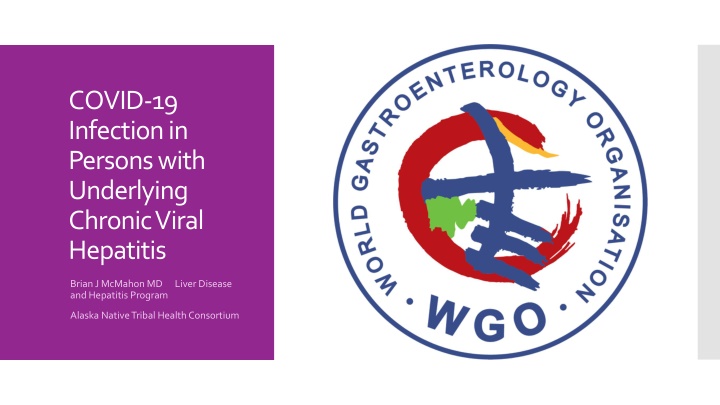
Understanding COVID-19 Impact on Chronic Viral Hepatitis Patients
Explore the relationship between COVID-19 and chronic viral hepatitis, including liver injury, risks for obese individuals, and managing liver disease during the pandemic. Learn about testing protocols, medication refills, and care recommendations for liver disease patients.
Download Presentation

Please find below an Image/Link to download the presentation.
The content on the website is provided AS IS for your information and personal use only. It may not be sold, licensed, or shared on other websites without obtaining consent from the author. If you encounter any issues during the download, it is possible that the publisher has removed the file from their server.
You are allowed to download the files provided on this website for personal or commercial use, subject to the condition that they are used lawfully. All files are the property of their respective owners.
The content on the website is provided AS IS for your information and personal use only. It may not be sold, licensed, or shared on other websites without obtaining consent from the author.
E N D
Presentation Transcript
COVID-19 Infection in Persons with Underlying Chronic Viral Hepatitis Brian J McMahon MD Liver Disease and Hepatitis Program Alaska Native Tribal Health Consortium
Liver injury in mild COVID-19 cases is usually transient does not require specific treatment Underlying chronic liver disease 1% of hospital admissions 2% of ICU patients with underlying COVID-19 Low serum albumin on hospital admission : Marker of COVID-19 severity Elevated Liver Function Tests in Patients with COVID-19 MMWR/ April 3, 2020 / 69(13);382 386
Obese persons with chronic HBV or HCV may be at a higher risk for adverse outcomes. Many likely have metabolic dysfunction associated non- alcoholic fatty liver disease (MAFLD) Obesity independent risk factor for death What we (do not) know Rare cases of severe liver injury have been described in patients with COVID-19 illness Challenge to differentiate whether increases in LFTs in persons with chronic HBV or HCV are due to SARS-CoV-2 infection, Its complications, Drug-induced liver injury.
In all patients admitted to hospital, test: HBsAg anti-HCV with HCV RNA if anti-HCV positive Liver Disease Workup during COVID-19 Pandemic Avoid procedures during the COVID-19 illness That could put others at risk such as liver US or other advanced imaging unless clinical suspicion for biliary obstruction, cholangitis, venous thrombosis Reschedule these procedures for after patients have recovered from COVID-19
Ensure that patients have refills for essential medications Provide 90-day supplies instead of 30-day supplies for HBV oral antiviral drugs Full course of DAA medications to complete HCV treatment if this has been started Caring for Patients with Liver Disease from Afar Many insurance companies are waiving early medication refill limits. Instruct patients to wash their hands, practice social distancing, disinfect surfaces frequently, stay away from those who are ill For tests postponed: Remind patients who need them to follow up when restrictions are lifted. Give them a specific plan.
It is not known whether patients with chronic HCV or HBV infection have a greater risk or not of severe disease after acquiring COVID-19 COVID-19 in Patients with HBV or HCV Unknown whether patients on antiviral drugs for HCV or HBV are at less of a risk of severe outcomes after acquiring COVID-19 Do not stop antiviral meds for HBV or HCV in patients who present with COVID-19
Currently FDA-approved drugs can bind to the RdRp site on the CoV-SARS-2 virus strain: Sofosbuvir, Ribavirin Tenofovir, Medications that can bind in vitro to RdRp sites of CoV-SARS-2 strain of Coronavirus
Drugs that Attach to Coronaviruses From AASLD Webinar on COVID-19 and the Liver
Liver involvement due to COVID-19 occurs in up to half of patients who are hospitalized All seriously ill persons with COVID-19 should have LFTs done as part of their initial evaluation Persons with elevated LFTs and COVID-19 should also have testing for other concomitant liver conditions such as HBV and HCV and investigated for NAFLD Caution is advised in prescribing medications that might benefit persons with COVID-19, especially those with underlying liver disease. Some medications not approved for COVID-19 may cause liver toxicity Conclusions
Clinical Insights for Hepatology and Liver Transplant Providers During the COVID-19 Pandemic, AASLD, updated 4/7/20. Available at www.aasld.org Elfiky, A. Ribavirin, remdesivir, sofosbuvir, galidesivir, and tenofovir against SARS-CoV-2 RNA dependent RNA polymerase (RdRp): A molecular docking study, Life Sciences, online 3/25/20 in press pre-proof; https://doi.org/10.1016/j.lfs.2020.117592 Zhang C, Shi L, Wang F. Liver injury in COVID-19: management and challenges. The Lancet. 3/4/20. DOI: https://doi.org/10.1016.S2468-1253(20)30057-1 References Guan WJ, Zhong NS. Clinical Characteristics of Covid-19 in China. Reply. N Engl J Med 2020;382. Preliminary Estimates of the Prevalence of Selected Underlying Health Conditions Among Patients with Coronavirus Disease 2019 - United States, February 12-March 28, 2020. MMWR Morb Mortal Wkly Rep 2020;69:382-386.
